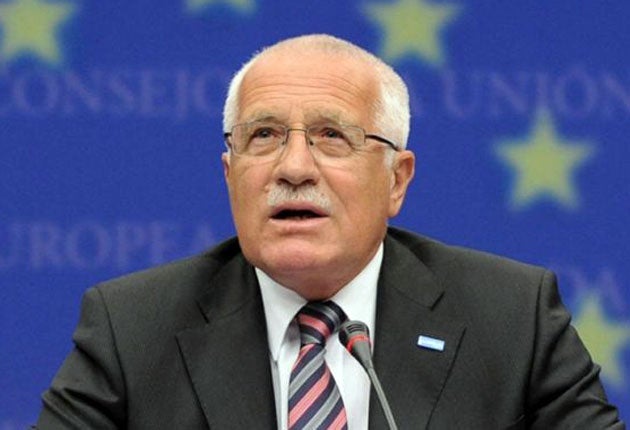Czech leader demands addition of footnote to Lisbon Treaty

Your support helps us to tell the story
From reproductive rights to climate change to Big Tech, The Independent is on the ground when the story is developing. Whether it's investigating the financials of Elon Musk's pro-Trump PAC or producing our latest documentary, 'The A Word', which shines a light on the American women fighting for reproductive rights, we know how important it is to parse out the facts from the messaging.
At such a critical moment in US history, we need reporters on the ground. Your donation allows us to keep sending journalists to speak to both sides of the story.
The Independent is trusted by Americans across the entire political spectrum. And unlike many other quality news outlets, we choose not to lock Americans out of our reporting and analysis with paywalls. We believe quality journalism should be available to everyone, paid for by those who can afford it.
Your support makes all the difference.The Czech President, Vaclav Klaus, raised a new obstacle to ratifying the Lisbon Treaty yesterday, telling Sweden, which holds the EU presidency, that he wanted a footnote added to the document before signing it into force.
Only the signatures of the Czech and Polish presidents are needed to ratify the treaty, which gives the 27-nation EU greater sway in world affairs by appointing a full-time president and foreign minister and by streamlining decision-making.
The Swedish Prime Minister, Fredrik Reinfeldt, said he had spoken to Mr Klaus who had asked for a two-sentence footnote to be added relating to the Charter of Fundamental Rights. "He said he wants this adopted by the council [of EU leaders]," Mr Reinfeldt said. "I told him this is the wrong message at the wrong time for the EU. I told him clearly it is his ink on the paper that counts and I don't want this to delay the treaty going through as soon as possible."
The Czech President told Mr Reinfeldt that he would sign the treaty if he received the additional wording and the Czech Constitutional Court rejected a legal challenge that had been filed by a group of senators on the treaty.
"We need clarification on exactly what he is asking for. But he said we must await the constitutional court process first, then he will clarify. But he is asking for additional measures, so he should clarify that and that's what I told him," Mr Reinfeldt, whose country holds the rotating EU presidency, said.
"As I understand, it's linked to the Charter of Fundamental Rights. It's a footnote, but he didn't define it."
Mr Klaus may have decided the odds are heavily stacked against him now that Irish voters have backed the treaty and the Polish President is expected to sign it.
Persuading other EU member states to add the footnote could help him save face and show he achieved something with his resistance to the charter. He could also be seeking to delay its ratification further.
Either way, it is another headache for the EU as it battles the global economic crisis and tries to put together the new line-up of its executive body, the European Commission.
Join our commenting forum
Join thought-provoking conversations, follow other Independent readers and see their replies
Comments